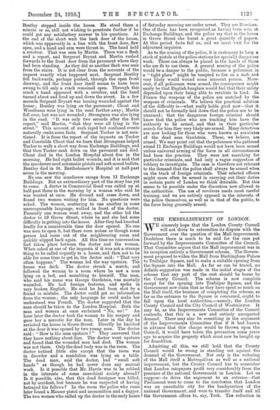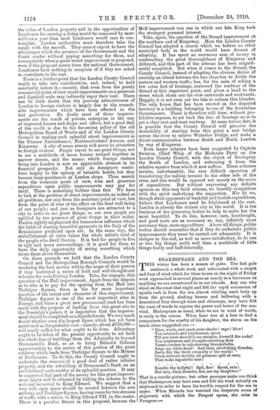THE EMBELLISHMENT OF LONDON.
WE sincerely hope that the London County Council will not drive to extremities its dispute with the Government over the question of the Mall improvement. Doubtless there is much to be said for the case put forward by the Improvements Committee of the Council. That Committee argues that the Mall improvement was in its inception entirely a Government scheme. The Govern- ment proposed to widen the Mall from Buckingham Palace to Trafalgar Square, and to make a suitable opening from the Square into the Mall. As far as can be traced, no definite suggestion was made in the initial stages of the scheme that any part of the cost should be borne by the County Council. The scheme is now complete except for the opening into Trafalgar Square, and the Government now claim that as they have spent so much on the Mall itself, the business of completing the scheme, so far as the entrance to the Square is concerned, ought to fall upon the local authorities,—namely, the London County Council and the City Council of Westminster. It may be, as the Improvements Committee of the Council contends, that this is a new and entirely unexpected demand. There may also be something in the argument of the Improvements Committee that if it had known in advance that this charge would be thrown upon the Council, it would have taken the precaution some years ago to acquire the property which must now be bought up for demolition.
Admitting all this, we still hold that the County Council would be wrong in standing out against the demand of the Government. Not only is the widening of the Mall itself a Metropolitan as well as a national improvement, but the County Council has to remember that London ratepayers profit very considerably from the presence of the national Government in London. Let us suppose—to drive the argument, to an extreme—that Parliament were to come to the conclusion that London was an unsuitable city for the headquarters of the national Government, and were to transfer itself and all the Government offices to, say, York. The reduction in the value of London property and in the opportunities of Londoners for earning a living would be measured by more millions a year than most Londoners would care to con- template. London authorities must therefore take the rough with the smooth. They cannot expect to have the advantages which the presence of the Government and the Court confer without paying something for them, and consequently when a great street improvement is proposed, even if the proposal comes from the national Government, Londoners have nothing to complain of if they are asked to contribute to the cost.
There is a further point that the London County Council ought to take into consideration, and, indeed, to hold constantly before it,—namely, that even from the purely commercial point of view street improvements on a generous and dignified scale may indirectly repay their cost. There can be little doubt that the growing attractiveness of London to foreign visitors is largely due to the remark- able improvements which have been effected in the last generation. No doubt most of these improve- ments are the result of private enterprise in the way of improved houses and shops and offices, but a good deal of the credit is due to the far-seeing policy of the old Metropolitan Board of Works and of the London County Council in making such splendid street improvements as the Thames Embankment, Northumberland Avenue, and Kingsway. A city of mean streets will never be attractive to foreign visitors. People travel to see great things, not to see a multitude of mean houses wedged together in narrow streets, and the money which foreign visitors bring into London is now an appreciable element in its financial prosperity. Not only do foreigners contri- bute largely to the upkeep of valuable hotels, but they become large purchasers at London shops. Thus, merely from the economic point of view, wise and generous expenditure upon public improvements may pay for itself. There is something further than this. We have to look at the problem of street improvements, as indeed at all problems, not only from the monetary point of view, but from the point of view of the effect on the final well-being of our people ; and just as foreigners are attracted to a city in order to sea great things, so our own people are uplifted by the presence of great things in their midst. Ruskin rightly emphasised the tremendous influence which the habit of wearing beautiful garments in the Italy of the Renaissance produced upon art. In the same way, the embellishment of cities raises the whole artistic level of the people who dwell therein. It is bad for people to live in ugly and mean surroundings : it is good for them to have the daily opportunity of seeing something which raises them above themselves.
On these grounds we hold that the London County Council and the Metropolitan Borough Councils would be rendering the best service within the scope of their powers if they instituted a series of bold and well-thought-out schemes for embellishing London. Take, for example, this question of the Mall improvement. Apart from the dispute as to who is to pay for the opening from the Mall into Trafalgar Square, there is the far more important question of the extent and character of this improvement. Trafalgar Square is one of the most important sites in Europe, and when a great new processional road has been made with the purpose of leading from this great site to the Sovereign's palace, it is imperative that the improve- ment should be completed on a dignified scale. We very much doubt whether even the largest figure which has yet been mentioned as the probable cost—namely, about £150,000— will nearly suffice for what ought to be done. Advantage ought to be taken of the present opportunity to set back the whole line of buildings from the Admiralty to beyond Drummond's Bank, so as to bring Nelson's Column approximately to the centre of this portion of the great road way which leads from Trafalgar Square to the Houses of Parliament. To do this, the County Council ought to undertake the removal of a good deal of rather inferior property, and the rebuilding of Drummond's Bank on an architectural scale worthy of its splendid position. It may be suggested that part of the money for this great improve- ment might well be obtained by linking the scheme to the national memorial to King Edward. We suggest that a very wide open space should be created between the new archway and Trafalgar Square, leaving room for two streams of traffic with a statue to King Edward VII. in the centre. There is a peculiar fitness in this proposal, because the Mall improvement was one in which our late King took the strongest personal interest. Take, again, the question of the Strand improvement at the southern end of Kingsway. Here the London County Council has adopted a course which we believe no other municipal body in the world would have dreamt of adopting. It has spent an enormous sum of money in constructing the great thoroughfares of Kingsway and Aldwych, and this part of the scheme has been magnifi- cently completed. But when it comes to the Strand, the County Council, instead of adopting the obvious device of creating an island between the two churches to divide the eastern and western traffic, has, for the sake of selling a few extra feet of frontage, narrowed the roadway of the Strand at this important point, and given a bend to the street which shuts out the view eastwards and westwards. Happily it is not even yet too late to redeem this blunder. The only house that has been erected on the disputed territory is a building belonging to one of the Australian Governments. There is therefore still time, without pro- hibitive expense, to set back the line of frontage so as to get a clear east-and-west roadway. At some future date it is possible that the County Council will perceive the desirability of starting from this point a new bridge across the river to relieve Waterloo Bridge, and make a direct communication between South and North London by way of Kingsway. Even larger schemes have been suggested by Captain Swinton, Chief Whip of the Moderate Party on the London County Council, with the object of developing the South of London, and redeeming it from the relative squalor from which it now suffers. These schemes involve, unfortunately, the very difficult operation of transferring the railway termini to the other side of the river, and this would be opposed not merely on the score of expenditure. But without expressing any definite opinion on this very bold scheme, we heartily sympathise with the spirit underlying the suggestion. Nor do we, though strict opponents of wasteful and foolish expenditure, believe that Londoners need be frightened at the cost. London is already the richest city in the world. It is the business of her governing bodies to help to make her the most beautiful. To do this, however, care, forethought, and good taste are as necessary as, nay, infinitely more necessary than, mere expenditure. Above all things, public bodies should remember that if they do undertake public improvements they must be carried out adequately. It is cheaper in the end, as well as more satisfactory, to do one or two big things really well than a multitude of little things feebly and half-heartedly.







































 Previous page
Previous page